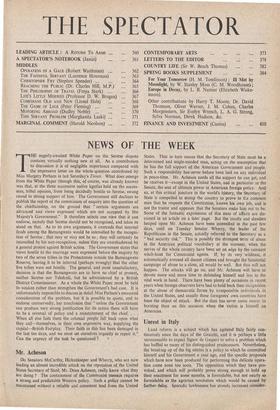NEWS OF THE WEEK
THE eagerly-awaited White Paper on the Seretse dispute contains. virtually nothing new at all. As a contribution to discussion it is of negligible importance compared with the impressive letter on the whole question contributed by Miss Margery Perham in last Saturday's Times. What does emerge from the White Paper (though this, of course, was already known) was that, at the three successive native kgotlas held on the succes- sion, tribal opinion, from being decidedly hostile to Seretse, swung round to strong support of him. The Government still declines to publish the report of the commission of enquiry into the question of the chieftainship, on the ground that " certain arguments are advanced and views expressed which are not accepted by His Majesty's Government." It therefore selects one view that it can endorse, namely that Seretse should not be recognised, and takes its stand on that. As to its own arguments, it contends that internal feuds among the Bamangwato would be intensified by the recogni- tion of Seretse ; that may or may not be so ; they will certainly be intensified by his non-recognition, unless they are overshadowed by a general protest against British action. The Government states that views hostile to the marriage were expressed before the enquiry by two of the seven tribes in the Protectorate outside the Bamangwato Reserve, leaving it to be inferred (perhaps wrongly) that the other five tribes were not hostile. The general, and most unsatisfactory, decision is that the Bamangwato are to have no chief at present, neither Seretse nor Tshekedi, but be administered by a British District Commissioner. As a whole the White Paper must be held to weaken rather than strengthen the Government's bad case. It is unfortunately impossible to discuss in detail Miss Perham's measured consideration of the problem, but it is possible to quote, and to endorse unreservedly, her conclusion that " unless the Government can produce very strong justification for its action there will have to be a reversal of policy and a reinstatement of the chief. . . . When all else fails them the colonial people fall back -upon what they call—themselves, in their own expressive way, supplying the capital—British Fairplay. Their faith in this has been damaged in the last ten days, and we must set ourselves urgently to repair it."
Can the urgency of the task be questioned ? -






























































 Previous page
Previous page